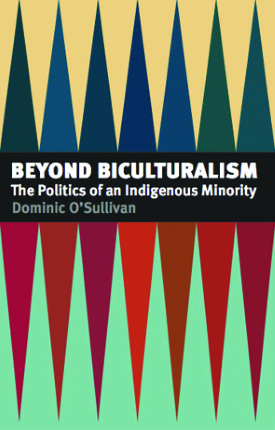Beyond Biculturalism: The Politics of an Indigenous Minority—Dominic O’Sullivan (2007)

'Beyond Biculturalism' is a critical analysis of contemporary Māori public policy. Bicultural political theory dominated Māori–Crown relationships during the 1980s and 1990s, and O’Sullivan argues that biculturalism inevitably makes Māori the junior partner in a colonial relationship that obstructs Māori aspirations to self-determination.
Publication details
O’Sullivan, D. Beyond Biculturalism: The Politics of an Indigenous Minority. Wellington: Huia Publishers, 2007.
About the book
Dominic O’Sullivan (Te Rarawa, Ngāti Kahu) explores the politics of indigeneity and self-determination as alternative political ideas for thinking about Māori relationships with the state. Against this background, and by drawing on Australian and Canadian comparisons, the book examines contemporary Māori political issues such as the Foreshore and Seabed Act 2004, Maori parliamentary representation, the 'one law for all' ideology, settlements of Māori grievances against the Crown, and Māori economic development.
Beyond Biculturalism examines different philosophical premises which inform biculturalism and self-determination and offers understandings of the location of power in both. O’Sullivan explains that biculturalism assumes a sharing of power but with Māori assuming a junior partner, while self-determination offers the opportunity for greater levels of autonomy and the residing of greater power within iwi, hapū and whānau.
Further information
- Out of print
This publication is part of the series Te Takarangi: Celebrating Māori publications - a sample list of 150 non-fiction books produced by a partnership between Royal Society Te Apārangi and Ngā Pae o te Māramatanga.
